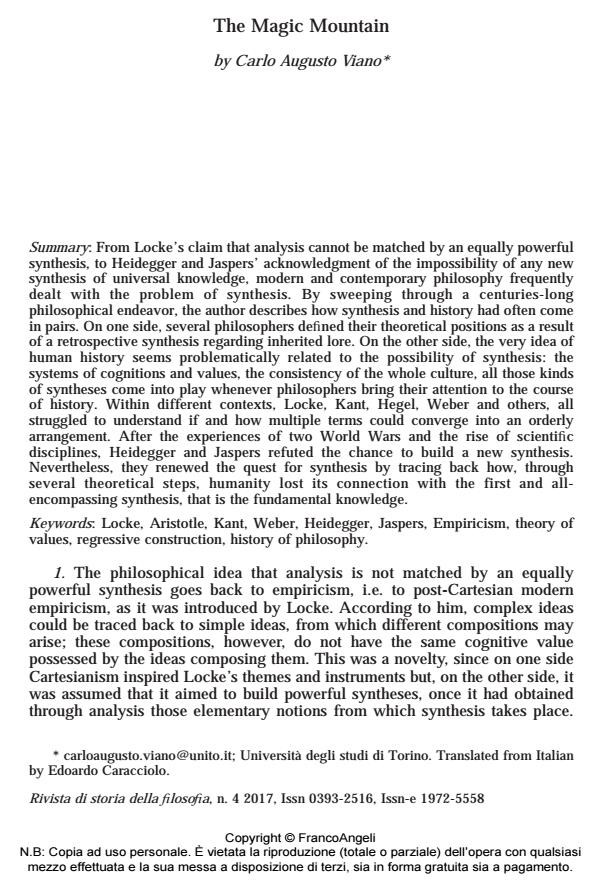The Magic Mountain
Titolo Rivista RIVISTA DI STORIA DELLA FILOSOFIA
Autori/Curatori Carlo Augusto Viano
Anno di pubblicazione 2017 Fascicolo 2017/4
Lingua Inglese Numero pagine 10 P. 575-584 Dimensione file 40 KB
DOI 10.3280/SF2017-004003
Il DOI è il codice a barre della proprietà intellettuale: per saperne di più
clicca qui
Qui sotto puoi vedere in anteprima la prima pagina di questo articolo.
Se questo articolo ti interessa, lo puoi acquistare (e scaricare in formato pdf) seguendo le facili indicazioni per acquistare il download credit. Acquista Download Credits per scaricare questo Articolo in formato PDF

FrancoAngeli è membro della Publishers International Linking Association, Inc (PILA)associazione indipendente e non profit per facilitare (attraverso i servizi tecnologici implementati da CrossRef.org) l’accesso degli studiosi ai contenuti digitali nelle pubblicazioni professionali e scientifiche
From Locke’s claim that analysis cannot be matched by an equally powerful synthesis, to Heidegger and Jaspers’ acknowledgment of the impossibility of any new synthesis of universal knowledge, modern and contemporary philosophy frequently dealt with the problem of synthesis. By sweeping through a centuries-long philosophical endeavor, the author describes how synthesis and history had often come in pairs. On one side, several philosophers defined their theoretical positions as a result of a retrospective synthesis regarding inherited lore. On the other side, the very idea of human history seems problematically related to the possibility of synthesis: the systems of cognitions and values, the consistency of the whole culture, all those kinds of syntheses come into play whenever philosophers bring their attention to the course of history. Within different contexts, Locke, Kant, Hegel, Weber and others, all struggled to understand if and how multiple terms could converge into an orderly arrangement. After the experiences of two World Wars and the rise of scientific disciplines, Heidegger and Jaspers refuted the chance to build a new synthesis. Nevertheless, they renewed the quest for synthesis by tracing back how, through several theoretical steps, humanity lost its connection with the first and all-encompassing synthesis, that is the fundamental knowledge.
Parole chiave:Locke, Aristotle, Kant, Weber, Heidegger, Jaspers, Empiricism, theory of values, regressive construction, history of philosophy
Carlo Augusto Viano, The Magic Mountain in "RIVISTA DI STORIA DELLA FILOSOFIA" 4/2017, pp 575-584, DOI: 10.3280/SF2017-004003